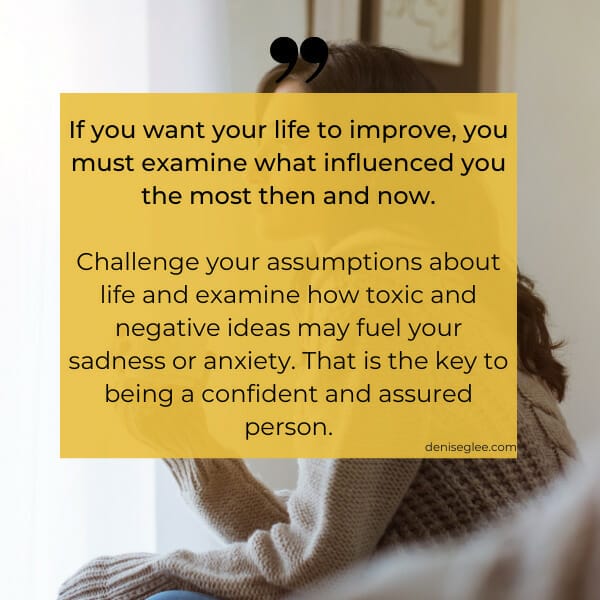
Self-Confidence. How to Build it, Despite Challenging Times
- Updated: April 12, 2024
Confidence is a crucial quality that can assist you in various aspects of life. It is the key ingredient that will help you to build healthy relationships, achieve your goals, and have a positive outlook on life. However, for some individuals, attaining this quality can be a significant challenge due to several reasons.
As a life coach for entrepreneurs, my aim is to help you understand that there is always hope, despite how challenging your current circumstance may be. And if you have people suggesting that your goals seem impossible or “crazy,” or encouraging you to quit, you need a burst of positive energy. In this article, we will discuss the obstacles to building your self-confidence and how you can regain a sense of calm and purpose.
First, let’s talk about some of the reasons why confidence is hard to obtain. This is important because we cannot overcome what we do not understand.
If you expose yourself to negative content and ideas without proper context, then you lack the desire to feel confident in anything, including yourself.
Denise G. Lee Tweet
Obstacles to self-confidence
Number one obstacle: Thinking that life is hard
If there is a common refrain that I’ve heard far too many times, it is the thought that “life is too hard.”
Well-meaning friends and family may have repeatedly conveyed this message. And because our brains are sophisticated recording devices, we may have internalized this idea as true on an unconscious level.
But is life really hard?
As a recovering addict and incest survivor, I used to tell myself that life was a challenge – a dog-eat-dog, a giant zero-sum game in which people battled for limited resources and even shorter time. And so, I confirmed this idea through reading negative stories online, listening to sad stories from friends and family, and constantly underperforming in my personal and professional life.
And when things inevitably failed due to my negative outlook, I concluded, “Life is hard.”
As I think about the personal stories of my mentors and people who have inspired me, like Frank Kern, I realized something very important: Life is meant to teach, not harm.
If you expose yourself to negative content and ideas without proper context, then you lack the desire to feel confident in anything, including yourself.

Gratefully recovering addict
When I first started my journey towards recovery, I realized that there were several shortcomings that I needed to address. And while I was aware that things needed to change, the concept of being a grateful recovering addict seemed far-fetched and difficult to believe.
I have attended many 12-step recovery meetings and noticed that the walls of many AA (Alcoholics Anonymous) rooms displayed a sign that read ‘Gratitude’.
At the time, I couldn’t understand how I could possibly feel grateful as someone struggling with addiction, but now I realize that it was my addiction that caused me to question the messages of the past.
I needed to challenge my assumptions about life and examine how certain toxic and negative ideas were fueling my addictive tendencies. I came to the realization that for my life to improve, I needed to shift my mindset.
Questions for improve your mindset and self-confidence
- Are you prepared to shift your mindset?
- Which sacred cows need to die?
- Are you prepared to acknowledge that your inner king or queen is not wearing any clothes?
If you’re ready, in the next section, we’ll discuss how you can enhance your internal sense of worth and value.
In a world where societal pressures can be overwhelming, it takes great courage to be your true self. By embracing who you are, you inspire others to do the same. You are a shining example of self-confidence and bravery, and your authenticity radiates positivity to those around you.
Denise G. Lee Tweet
Three Tips to Improving Your Self-Confidence
Confidence Building Tip #1: Know Your Values
As I mentioned earlier, many of us have spent years letting others define what is needed and necessary. It become part of our life script. Take some time to understand your values. This is where you develop a sense of inner integrity, courage, and a sense of morality.
Here are some questions to help you think about your values:
- Which values matter most to you? Why does they matter?
- How do you do you want to interact with people at work? What about your home life?
- How do you want to be treated when you feel scared, sad, angry or mad? Why?
- If you died today, how do you want to be remembered by the people in your personal and professional life?
Confidence Building Tip #2: Examine Your Current Company
We are the sum of the three closest people around us. Are you afraid to tell your truth to them? Why is that? If everyone around you is lying about themselves, it’s no wonder you find yourself unwilling to be honest about your own struggles and shortcomings.
I understand the hesitation to be honest, especially with a stranger writing about honesty.
As humans, we want to be liked, and it’s baked into our DNA to avoid being cast aside. Safety lies in numbers. However, it’s crucial to question the quality of the relationships you have now.
Take a good and hard looking at the company you keep. Are they really helping you?
Is it genuinely safe to be around people who share your history. However, it is worth it if they demean, belittle, and undermine your confidence?
Just because they are familiar to you doesn’t mean they are healthy and safe to be around. It’s something to think about.
Lots of people suffer from low self-esteem because they spend way too much time around people with dangerous personalities.
Psychopaths, maladaptive narcissists, and sociopaths have a way of destroying anyone’s confidence over time.
In the next section, we will talk about how to invest in your personal well-being. One reason for your possible lack of confidence could be that you are neglecting your emotional, physical, and spiritual needs.

Confidence Building Tip #3: Invest in your self care
Have you traveled recently? Taking a trip on an airplane can be an exciting experience. Whether it’s a long-awaited vacation or a business trip, soaring through the sky on an airplane can be both exhilarating and nerve-wracking.
One thing you may have noticed during the pre-flight safety message is the instruction to put on your mask before assisting others in the event of an emergency. This may seem counterintuitive, as our first instinct is often to help others in need. However, it is important to remember that we are better equipped to help others once our own needs are taken care of.
In this section, we will explore ways that you can prioritize self-care and ensure that you are in a position to help others effectively. By taking care of yourself first, you can be a stronger support system for those around you.
Improve your morning routine
What does your morning routine look like? Do you jump out of bed and go cruising at a speed of 50 mph, and then wonder why you feel exhausted by 5 pm?
I believe that your morning routine plays a crucial role in shaping your mindset. Before I fully committed to my recovery program, my mornings looked quite different. I would immediately reach for my mobile phone on the nightstand, checking emails and notifications as soon as I woke up, and my mind would be overwhelmed with thoughts of all the tasks I needed to accomplish. However, things have changed now.
Denise’s morning routine
Before I even think about starting my work, I prioritize taking care of myself and my family.
My morning routine now involves:
- Closing my eyes and reflecting on the wisdom that the spirit world and my unconscious mind have to offer.
- Asking God for the strength to navigate through both known and unknown challenges.
- Meditating on spiritual readings and use my red light lamp while I stretch and rejuvenate my body.
- Take my dog for a walk.
- Enjoying a nourishing breakfast, and engage in meaningful conversations with my husband and son.
Only after this, do I feel prepared to dive into my work.
What to do if self-care is difficult for you
You may think, “Well, that’s great to do all of that Denise, but you don’t know my life.”
Well, I don’t you or your situation but I do know this: When you come from a traumatic and painful background, it’s natural to jump straight into work without a moment’s hesitation.
Easing into the day slowly may not feel normal because there are always countless tasks demanding your attention. However, in the journey of recovery, it’s essential to prioritize your spiritual, mental, and physical well-being. That’s how you can truly thrive.
Now, let me ask you:
- What does your morning routine look like?
- How can you make it even better?
Take a moment to ponder on these questions.
If you have lived life, then you have experienced trauma. Expectations. Experiences. Emotions. All the stuff impacts your sense of worth and identity. However, trauma doesn't have to break you. Trauma can help you evolve into a mature & enlightened person, if you allow it.
Denise G. Lee Tweet
Final thoughts about self-confidence
Building confidence involves increasing your sense of worth and value. It’s time to question the rationale behind your values. Are they based on yourself or unresolved past traumas? You owe it to yourself to analyze how your thoughts impact your current behavior.
If you require assistance in comprehending who you are, determining what is important, and devising a strategy to support your emotional and physical health, please don’t hesitate to contact me.
Dig deeper: Click here to listen to a episode about building your self worth or press the play button below.
Written by Denise G. Lee
DISCLAIMER: THIS ARTICLE DOES NOT PROVIDE MENTAL HEALTH ADVICE
The information in this article is for informational purposes only. No material in this article or website is to be a substitute for professional medical and/or mental health advice, diagnosis or treatment.
Always seek the advice of your physician or other qualified health care provider with any questions you may have regarding a medical condition or treatment and before undertaking a new health care regimen, and never disregard professional medical advice or delay in seeking it because of something you read from me or anyone else online.
Also, this article is not designed to diagnose or treat you or anyone with a suspected mental health illness. Please, if you need help, seek appropriate help from a lawyer, health care provider or law enforcement officer





